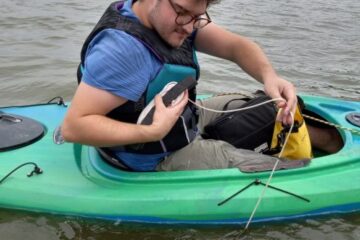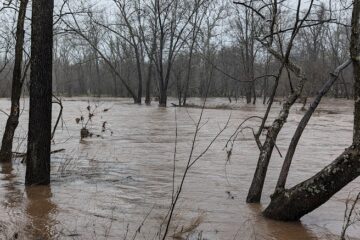 The approach of the new year is always a time of reflecting on the past and excitement about the future. For Raritan Headwaters Association (RHA) and the many New Jersey residents who support its mission of protecting the water in our rivers, streams and homes, that sense of anticipation is heightened in December 2023.
The approach of the new year is always a time of reflecting on the past and excitement about the future. For Raritan Headwaters Association (RHA) and the many New Jersey residents who support its mission of protecting the water in our rivers, streams and homes, that sense of anticipation is heightened in December 2023.
On January 1, RHA will welcome its first new executive director in 17 years when Associate Director Mara Tippett takes over for Cindy Ehrenclou, who will remain with RHA to spearhead its fundraising efforts. Tippett and Ehrenclou sat down to talk about RHA’s momentum in 2023 and where the organization is going in 2024.
A smooth leadership transition is on the list of 2023 accomplishments. How are you feeling about the future, Cindy?
Cindy Ehrenclou: I’m excited. A thoughtful, deliberate transition process is something we’ve planned for. I knew Mara was ready to lead Raritan Headwaters because I’d had the privilege of seeing her in action over the years. Watching her since the Board voted her as my successor, I’m even more assured that we’ve made a great decision. She’s fearless. Passionate. She has scientific and policy expertise. I can’t wait to see what we accomplish under her leadership.
When you think about 2024, what are you looking forward to?
Mara Tippett: I think about all the great things that will emerge from our many partnerships — municipal partnerships, state partnerships, national partnerships. As our reputation has grown, so has our ability to conduct impactful projects throughout the watershed. You can expect big things in this area in 2024.
When you look back at 2023, what accomplishments stand out to you?
CE: It’s been a time of incredible momentum. We preserved 16 acres of critical watershed lands along the South Branch Raritan River, we watchdogged the toxic chemical cleanup at the Hercules site at the headwaters of the Black River, we developed a watershed management plan with partners for Budd Lake — we’d need an hour to list all the achievements. But one milestone that stands out was the way we defended the court decision to uphold the New Jersey Department of Environmental Protection’s classification of category 1 streams. That was a huge victory for clean water and citizen science.
Why does that matter?
MT: The court decision shows that the data collected by volunteer citizen scientists is of high enough quality to use for regulatory decisions, a precedent that will pave the way for us and for other community-driven scientific research nationwide.
CE: Defendable data is so valuable. Because of the water monitoring data provided by our staff scientists and trained citizens, 200 miles of stream in our watershed were upgraded and 600 miles of stream in New Jersey got stronger protections.
How have RHA’s facilities evolved in the past year?
MT: We opened a new South Branch Office — the hub of our Well Testing Program — at Darts Mill in Readington Township, allowing us to welcome residents in the southern part of our watershed. The location can’t be beat. It’s an historic 1800s millhouse right on the banks of the South Branch of the Raritan River. You can hear the river and see it from every window, serving as a constant reminder of our mission to protect and preserve.
You can also see evidence of RHA’s restoration work.
MT: Yes, the remnants of the Darts Mill Dam. That’s part of a restoration project we initiated in 2023, one of several big, active river restoration projects that will open up fish passage and improve water quality along the South Branch.
One of RHA’s partners is Rutgers University. What will you be doing with them in 2024?
CE: Rutgers has been a fabulous partner in watershed protection over decades. We partner with them to develop green infrastructure projects. They provide interns. We’ve shared data and partnered on studies on everything from microplastics to arsenic. In 2024, we’re beginning a very exciting project with Rutgers in the Highlands region.
MT: We’re going to be partnering with Rutgers to draft new watershed management plans for three of our sub-watersheds in the New Jersey Highlands, where the Raritan River originates. That means we’ll have a plan for every one of our Highlands sub-watersheds, opening the door to implementation — bringing in more funding and actually doing the work mapped out in the plans. That’s really exciting.
RHA is an Accredited Land Trust. You applied to the Land Trust Accreditation Commission for accreditation renewal in 2023. That’s expected to come through in 2024. Why is reaccreditation a big deal?
MT: Being an Accredited Land Trust not only strengthens our dedication to protecting these vital watershed lands, but it also assures our communities and our partners that we’re committed to ethical, transparent, effective stewardship. It means we’re sound, well-governed and well-managed from a fiscal point of view. It’s a badge of honor. And it’s a promise that we’re guardians of these lands and we’re going to do it properly in perpetuity. We take it very seriously.
Speaking of 2024, Cindy, you’ve made it clear that you’re not leaving RHA. What’s your new role?
CE: I’m receiving lots of kind congratulations on my retirement, but I’m too invested in this organization’s future to disappear into the sunset. I’m going to be leading Raritan Headwaters’ fundraising initiatives. I’ve had a vision for the future of Fairview Farm, our headquarters, for a long time, but as executive director, I couldn’t give that vision the focus it deserved.
A vision?
CE: Yes. We’re very proud of Fairview Farm and its early 1800s barn complex. We did a restoration project more than 20 years ago, but it needs to go to the next level. With repairs and upgrades we can establish it as an amazing resource for the community to enjoy. This fantastic structure — the backdrop of our events, from Shedfest to Lantern Walk, and home to our nature classroom — has the potential to offer so much more that we would like to share with our community. I want to find partners who share that vision, and together we’re going to make it a reality.



